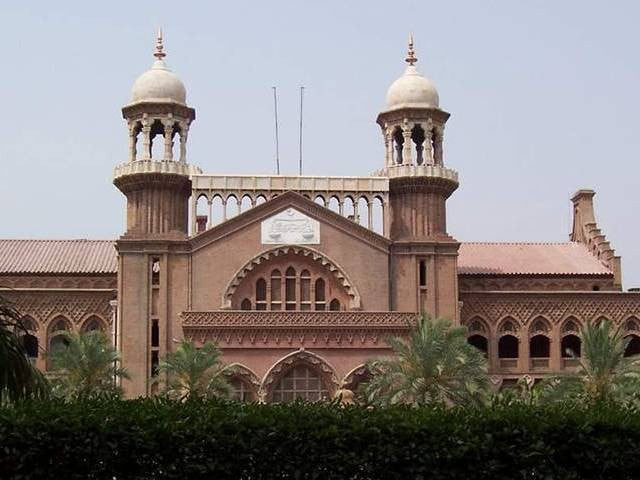PTI challenges appointment of election officials in LHC
Party questions validity of ECP’s move to appoint DROs and ROs from Punjab’s bureaucracy

The Pakistan Tehreek-e-Insaf (PTI) has challenged the Election Commission of Pakistan’s (ECP) decision to appoint officials from Punjab’s bureaucracy for election duty.
PTI Additional Secretary General Umair Khan Niazi on Wednesday filed a petition in the Lahore High Court (LHC) through Barrister Abuzar Salman Khan Niazi, questioning the validity of the ECP’s move to appoint District Returning Officers (DROs) and Returning Officers (ROs) from Punjab’s bureaucracy for the upcoming general elections.
PTI has made several high-profile officials as a party, including the President of Pakistan, Prime Minister, Chief Minister, and the Election Commission, in its petition while alleging a potential bias in the selection process, prompting concerns about the impartiality of the upcoming electoral proceedings.
The party contended that the ECP should engage in a consultation process with the Lahore High Court’s Chief Justice for the appointment of judicial officers as DROs and ROs under sections 50 and 51 of the Elections Act 2017.
Moreover, the court was urged to prevent the ECP from appointing officers from executive authorities during the plea's pendency, emphasising the need for a fair and unbiased electoral process.
Read also: PTI urges ECP to publish party poll certificate
Niazi articulated the PTI's concerns regarding the general elections being held beyond the constitutionally mandated period. Despite the hope for democracy's survival, there is widespread scepticism and restrained jubilation among the populace. The elections are poised to take place amidst what Niazi describes as the worst crackdown in Pakistan's history on civil liberties and constitutional protections.
The PTI representative argued that the party has been subjected to a deliberate scheme by caretaker governments, both federal and provincial, to suppress its democratic and nationalist spirit. Citing instances in Punjab, where Caretaker Chief Minister Mohsin Naqvi allegedly influenced the bureaucracy against PTI, Niazi painted a picture of bias and attempts to eliminate the party from the political landscape.
The allegations extend to the federal government, with claims of heavy-handed treatment since the ‘regime change’, including political victimisation and persecution. Niazi highlighted the misuse of executive power for prosecution and arrest, asserting a state-sponsored attempt to annihilate PTI as a political force.
The PTI’s legal representative underscored the caretaker governments' frequent transfer-postings in the bureaucracy, a violation of the Elections Act 2017's restrictions on such actions. Sections 50(1)(b) and 51(1) of the Elections Act, which involve the appointment of government officers as DROs and ROs, were challenged as violative of Article 218(3) of the Constitution.
Also read: PTI announces office-bearers following intra-party elections
Niazi contends that the appointment of executive officials as District Returning Officers (DROs) and Returning Officers (ROs) grants the government an undue and dominant role in the electioneering process.
This, he argues, undermines the independent role assigned to the ECP by the Constitution and threatens the constitutional mandate of conducting free, fair, and just elections under Article 218 of the Constitution.
The barrister draws attention to the susceptibility of the bureaucracy to executive interference, emphasising its lack of functional autonomy and institutional security in terms of postings and transfers.
According to Niazi, the provisions in the Elections Act mandating the appointment of executive officers as DROs and ROs effectively sanction executive interference in the electoral process, a violation of Article 218(3) of the Constitution.
Particularly, Niazi challenges Section 50(1)(b) of the Elections Act, arguing that its restriction on the appointment of executive officers as DROs to a "list of offices provided by the government or a provincial government" is unconstitutional.
He asserts that this restriction not only narrows the pool of selection available to the ECP but also relegates the ECP's role to a secondary nature in the appointment process, granting the government a more dominant function. This, he claims, goes against the spirit of the Constitution and violates both Article 220 and Article 218.
In the plea to the court, Niazi requests the declaration of Sections 50(1)(b) and 51(1) of the Elections Act 2017 as unconstitutional. Alternatively, he prays for the declaration of Section 50(1)(b) as unconstitutional to the extent of the expression "list of officers provided by the government or a provincial government."
(With additional input from Imran Adnan)



















COMMENTS
Comments are moderated and generally will be posted if they are on-topic and not abusive.
For more information, please see our Comments FAQ